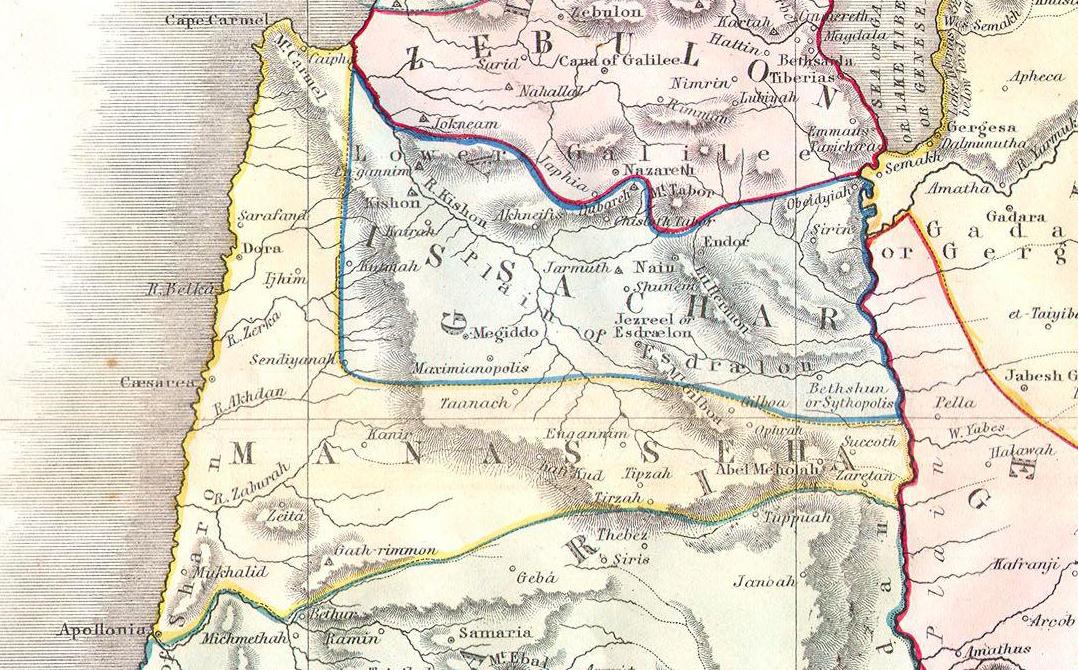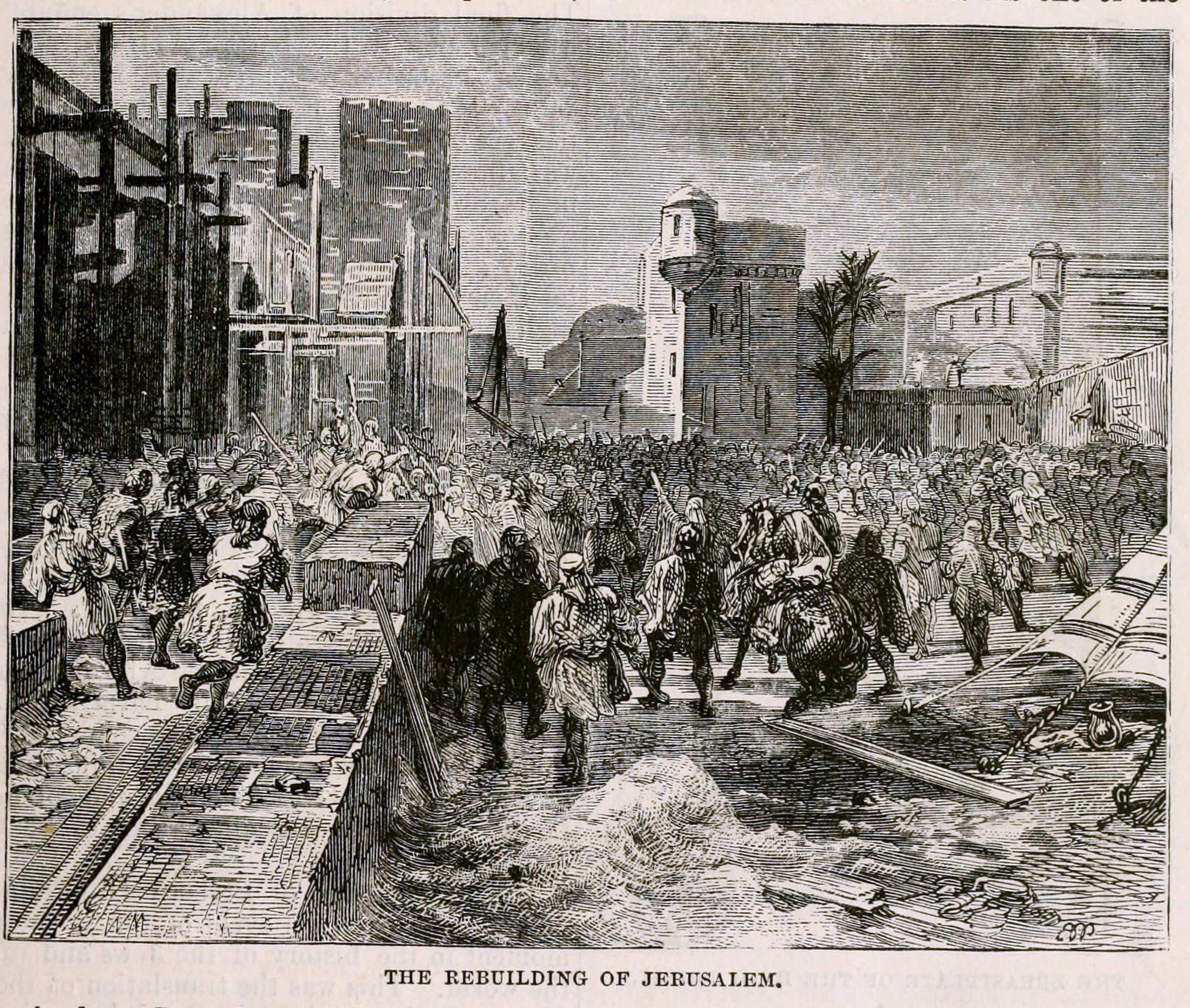|
Jesiah
Jesiah (also Ishiah, Ishijah, Isshiah, Isshijah, Jeshaiah) is a name found in the Bible. The Hebrew form of the name is ''yishshayah'' (in one case ''yishshayahu''), meaning "man of Jah." The Bible contains five figures by this name. *Jesiah son of Izrahiah, son of Uzzi, son of Tola, son of Issachar, found in a genealogy of the Tribe of Issachar. *Jesiah, a Korahite and member of the Tribe of Benjamin, listed among the warriors who came to David at Ziklag. *Jesiah, leader of the "sons of Rehabiah," a Levite Levites (or Levi) (, he, ''Lǝvīyyīm'') are Jewish males who claim patrilineal descent from the Tribe of Levi. The Tribe of Levi descended from Levi, the third son of Jacob and Leah. The surname ''Halevi'', which consists of the Hebrew defi ... in the time of David. *Jesiah, son of Uzziel, son of Kohath, son of Levi. This Jesiah is recorded as being the father of Zechariah. *Jesiah, one of the "descendants of Harim," found in a list of men who took foreign wives in the ... [...More Info...] [...Related Items...] OR: [Wikipedia] [Google] [Baidu] |
Bible
The Bible (from Koine Greek , , 'the books') is a collection of religious texts or scriptures that are held to be sacred in Christianity, Judaism, Samaritanism, and many other religions. The Bible is an anthologya compilation of texts of a variety of forms originally written in Hebrew, Aramaic, and Koine Greek. These texts include instructions, stories, poetry, and prophecies, among other genres. The collection of materials that are accepted as part of the Bible by a particular religious tradition or community is called a biblical canon. Believers in the Bible generally consider it to be a product of divine inspiration, but the way they understand what that means and interpret the text can vary. The religious texts were compiled by different religious communities into various official collections. The earliest contained the first five books of the Bible. It is called the Torah in Hebrew and the Pentateuch (meaning ''five books'') in Greek; the second oldest part was a coll ... [...More Info...] [...Related Items...] OR: [Wikipedia] [Google] [Baidu] |
Issachar
Issachar () was, according to the Book of Genesis, the fifth of the six sons of Jacob and Leah (Jacob's ninth son), and the founder of the Israelite Tribe of Issachar. However, some Biblical scholars view this as an eponymous metaphor providing an aetiology of the connectedness of the tribe to others in the Israelite confederation. Name Two different etymologies for the name of ''Issachar'' have been proposed based on the text of the Torah, which some textual scholars attribute to different sources—one to the Yahwist and the other to the Elohist. The first derives it from ''ish sakar'', meaning ''man of hire'', in reference to Leah's hire of Jacob's sexual favours for the price of some mandrakes. The second derives it from ''yesh sakar'', meaning ''there is a reward'', in reference to Leah's opinion that the birth of Issachar was a divine reward for giving her handmaid Zilpah to Jacob as a concubine. Scholars suspect the former explanation to be the more likely name for a tr ... [...More Info...] [...Related Items...] OR: [Wikipedia] [Google] [Baidu] |
Tribe Of Issachar
According to the Hebrew Bible, the Tribe of Issachar () was one of the twelve tribes of Israel and one of the ten lost tribes. In Jewish tradition, the descendants of Issachar were seen as being dominated by religious scholars and influential in proselytism. The sons of Issachar, ancestors of the tribe, were Tola, Phuvah, Job and Shimron. Biblical narrative In the biblical narrative of the Book of Joshua, following the completion of the conquest of Canaan by the Israelite tribes, Joshua allocated the land among the twelve tribes. The territory allocated to Issachar stretched from the Jordan River in the east to Mount Carmel on the west, near to the Mediterranean coast, including the fertile Esdraelon plain between present-day Lower Galilee and Samaria. It was bounded on the east by East Manasseh, the south by West Manasseh, and the north by Zebulun and Naphtali. There is a consensus among scholars that the accounts in the Book of Judges are not historically reliable. Alternati ... [...More Info...] [...Related Items...] OR: [Wikipedia] [Google] [Baidu] |
Tribe Of Benjamin
According to the Torah, the Tribe of Benjamin () was one of the Twelve Tribes of Israel. The tribe was descended from Benjamin, the youngest son of the patriarch Jacob (later given the name Israel) and his wife Rachel. In the Samaritan Pentateuch the name appears as ''Binyamīm'' (). The Tribe of Benjamin, located to the north of Judah but to the south of the Kingdom of Israel, is significant in biblical narratives as a source of various Israelite leaders, including the first Israelite king, Saul, as well as earlier tribal leaders in the period of the Judges. In the period of the judges, they feature in an episode in which a civil war results in their near-extinction as a tribe. After the brief period of the united kingdom of Israel, Benjamin became part of the southern Kingdom of Judah following the split into two kingdoms. After the destruction of the northern kingdom, Benjamin was fully absorbed into the southern kingdom. After the destruction of Judah by the Babylonians in ... [...More Info...] [...Related Items...] OR: [Wikipedia] [Google] [Baidu] |
David
David (; , "beloved one") (traditional spelling), , ''Dāwūd''; grc-koi, Δαυΐδ, Dauíd; la, Davidus, David; gez , ዳዊት, ''Dawit''; xcl, Դաւիթ, ''Dawitʿ''; cu, Давíдъ, ''Davidŭ''; possibly meaning "beloved one". was, according to the Hebrew Bible, the third king of the United Kingdom of Israel. In the Books of Samuel, he is described as a young shepherd and harpist who gains fame by slaying Goliath, a champion of the Philistines, in southern Canaan. David becomes a favourite of Saul, the first king of Israel; he also forges a notably close friendship with Jonathan, a son of Saul. However, under the paranoia that David is seeking to usurp the throne, Saul attempts to kill David, forcing the latter to go into hiding and effectively operate as a fugitive for several years. After Saul and Jonathan are both killed in battle against the Philistines, a 30-year-old David is anointed king over all of Israel and Judah. Following his rise to power, David ... [...More Info...] [...Related Items...] OR: [Wikipedia] [Google] [Baidu] |
Ziklag
Ziklag ( he, צִקְלַג) is the biblical name of a town that was located in the Negev region in the south-west of what was the Kingdom of Judah. It was a provincial town within the Philistine kingdom of Gath when Achish was king. Its exact location has not been identified with any certainty. Identification At the end of the 19th century, both Haluza (by Wadi Asluj, south of Beersheba)Cheyne and Black, ''Encyclopedia Biblica'' and Khirbet Zuheiliqah (located north-west of Beersheba and south-southeast of Gaza city) had been suggested as possible locations. Khirbet Zuheiliqah was identified by Conder and Kitchener as the location on the basis of ''Ziklag'' being a corruption of ''Zahaliku'', whence also ''Zuheiliqah''. The more recently proposed identifications for Ziklag are: * Albrecht Alt (1883–1956) proposed Tel Halif/ Tell el-Khuweilifeh, just beside kibbutz Lahav, some northeast of Beersheba. Due to this identification, for some time Lahav was officially named Tzekleg ... [...More Info...] [...Related Items...] OR: [Wikipedia] [Google] [Baidu] |
Levite
Levites (or Levi) (, he, ''Lǝvīyyīm'') are Jewish males who claim patrilineal descent from the Tribe of Levi. The Tribe of Levi descended from Levi, the third son of Jacob and Leah. The surname ''Halevi'', which consists of the Hebrew definite article "" ''Ha-'' ("the") plus ''Levi'' (Levite) is not conclusive regarding being a Levite; a titular use of HaLevi indicates being a Levite. The daughter of a Levite is a " ''Bat Levi''" (''Bat'' being Hebrew for "daughter"). The Tribe of Levi served particular religious duties for the Israelites and had political (administering cities of refuge) and educational responsibilities as well. In return, the landed tribes were expected to support the Levites with a tithe (), particularly the tithe known as the First tithe, ''ma'aser rishon''. The Kohanim, a subset of the Levites, were the priests, who performed the work of holiness in the Temple. The Levites, referring to those who were not Kohanim, were specifically assigned to * singi ... [...More Info...] [...Related Items...] OR: [Wikipedia] [Google] [Baidu] |
Levi
Levi (; ) was, according to the Book of Genesis, the third of the six sons of Jacob and Leah (Jacob's third son), and the founder of the Israelite Tribe of Levi (the Levites, including the Kohanim) and the great-grandfather of Aaron, Moses and Miriam. Certain religious and political functions were reserved for the Levites. Origins The Torah suggests that the name ''Levi'' refers to Leah's hope for Jacob to ''join'' with her, implying a derivation from ''yillaweh'', meaning ''he will join'', but scholars suspect that it may simply mean ''priest'', either as a loan word from the Minaean ''lawi'u'', meaning ''priest'', or by referring to those people who were ''joined'' to the Ark of the Covenant. Another possibility is that the Levites originated as migrants and that the name Levites indicates their ''joining'' with either the Israelites in general or the earlier Israelite priesthood in particular. [...More Info...] [...Related Items...] OR: [Wikipedia] [Google] [Baidu] |
Nehemiah
Nehemiah is the central figure of the Book of Nehemiah, which describes his work in rebuilding Jerusalem during the Second Temple period. He was governor of Persian Judea under Artaxerxes I of Persia (465–424 BC). The name is pronounced or in English. It is in Hebrew , ''Nəḥemyāh'', " Yah comforts". Most scholars believe Nehemiah was a real historical figure and that the Nehemiah Memoir, a name given by scholars to certain portions of the book written in the first person, is historically reliable.For confirmation that many scholars share this view, see For confirmation that most scholars share this view, see For an author who disagrees with the scholarly majority position on the historicity of Nehemiah and Ezra, but acknowledges the existence of that majority, see Book of Nehemiah narrative In the 20th year of Artaxerxes I (445 or 444 BC), Nehemiah was cup-bearer to the king. Learning that the remnant of Jews in Judah were in distress and that the walls of Jerus ... [...More Info...] [...Related Items...] OR: [Wikipedia] [Google] [Baidu] |
.jpg)





